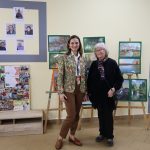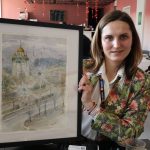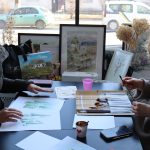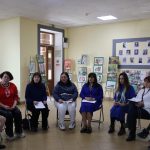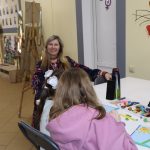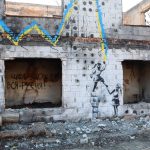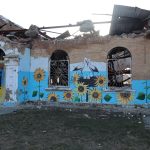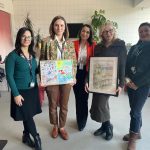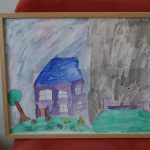Testimonies from the Psychological Support Center Funded by the AICS Emergency Project
by Barbara Taccone, Communications officer Aics Kiev, Marzo 2024, Voci dal campo, Oltremare
We arrive in Bucha on a splendid sunny day. The town, now associated with memories of horror and fear, presents itself to us as it was before the war: a welcoming location on the outskirts of Kyiv, with tree-lined avenues, full of life, and children playing in the streets. It is March 8th, and many women are gathered at the Psychological Support Center, where an event organized by Cesvi, “Celebration of Spring and Women’s Resilience,” is taking place.
Here, after the terrible 33 days of Russian occupation, the Italian Agency for Development Cooperation (AICS) funded an initiative by the Italian humanitarian organization aimed at providing essential protection goods and services, with particular attention to psycho-social support for women and children victims of trauma.
On the occasion of International Women’s Day, the Center is lively with Cesvi staff, psychologists, educators, and operators trained thanks to the project. Among them is Nataliia Levchenko, president of the administrative board of the organization Ya Buchanez, Cesvi’s local partner.
“Before February 27, 2022, life here was calm,” Nataliia tells us. “Bucha was the place where young couples moved to find some peace from the hustle and bustle of the city. It was known as the town of children.” The town, with its 40,000 inhabitants, welcomed many families from the capital and numerous Ukrainians fleeing Crimea, Donetsk, and Luhansk, internally displaced since 2014 seeking refuge: “No one was prepared for what would happen that day: waking up one morning with tanks at the city gates and war sirens blaring.”
The battle lasted until March 21, and only in April, with the liberation and withdrawal of Russian forces, did the horror of the occupation become evident: images of the city, with its corpses and mass graves, circled the globe. According to Kyiv authorities, in what was called the “Bucha massacre,” 1,400 people died, including 37 children. Survivors still bear the scars of atrocities, torture, abuse, and war crimes, systematically perpetrated against women.
“When we returned,” continues Nataliia, “the city was unrecognizable. Hundreds of people needed immediate humanitarian support; those who couldn’t escape the occupation were left completely isolated for more than a month in an open battlefield, subjected to violence and deprivations. The project funded by Italian Cooperation started in August 2022, four months after the occupation. Together with Cesvi, my organization began by distributing funds to the most vulnerable families and activating psychological support services here at the Center.”
What is now the Psychological Support Center in Bucha was before the war a meeting place for families and children, envisioned as a community gathering space by Nataliia’s association. Today, on International Women’s Day, it has returned to its original purpose: children make fabric flowers, and women discuss mental health, among other topics.
Among them is local artist Valentyna Tarasevych, named “Woman of the Day” for the occasion. Valentyna, 82, was forced to flee her home in Sivash in the Kherson region in 2016 due to the war, moving with her family to Bucha in search of peace and safety: “She is one of the numerous victims of what we call double trauma,” explains Nataliia. “She stayed in Bucha during the occupation. She survived by pretending to be in a wheelchair. After those freezing days, without water, electricity, and gas, amidst bombings, shootings, and death all around, the trauma was so devastating that it effectively impaired her motor skills: Valentyna could no longer get up from her chair. When someone experiences such intense hardship, their brain can respond by generating physical symptoms, like paralysis, even if there are no physical causes.”
Valentyna began a therapeutic journey through art to process her trauma. “Starting to paint,” Nataliia recounts, “she found in artistic expression a way to process her emotions. Over time, she honed her skills, exhibiting her works and sharing her story. She is one of the many examples of how crucial a therapeutic journey is to heal the invisible wounds of war.” Today, Valentyna participates in the activities of the Psychological Support Center in Bucha, bringing her skills and experiences to benefit the women and children who access it.
The AICS-funded project in Bucha has provided financial support to 4,000 people and psychological support to 300 individuals, mainly women, through over a thousand counseling sessions facilitated by a mobile unit operating in surrounding villages. Educators, psychologists, and social workers have been trained to specialize in treating post-traumatic stress disorder, helping to enhance the professional skills needed to effectively address the challenges related to the aftermath of the occupation.
“Last winter was an incredibly difficult period,” Nataliia explains. “Even after the occupation ended, the constant bombings and incessant sirens continued to torment us, causing frequent blackouts. The project was very important because it constituted a fundamental step forward towards healing and regenerating the community. The psychological support provided to the victims helped to mitigate the traumas of the war, allowing them to face the harsh present with greater emotional strength.”
As activities at the Center wind down, the sun begins to set. A few hours later, an air-raid siren breaks the calm of the city; Bucha is still at war, but the resilience of the community is palpable: “The women support each other, facing the traumas of abuse and loss, and together they try to rebuild not only their lives but also the shattered fabric of the city. And soon,” concludes Nataliia, “it will be spring again.”
